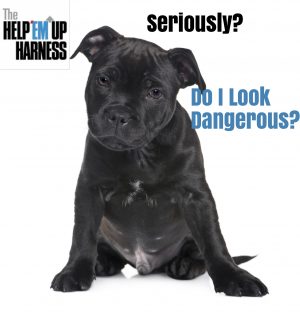 At Help ‘Em Up, our dog harnesses are often used on pit bulls who have lost their mobility or have hip dysplasia. These dogs are not the dangerous monsters often portrayed in the media. As a dog parent myself and as a business owner involved in the pet industry, I can tell you that pit bulls get a bad rap – in fact, all the breeds labeled as “bully breeds” do.
At Help ‘Em Up, our dog harnesses are often used on pit bulls who have lost their mobility or have hip dysplasia. These dogs are not the dangerous monsters often portrayed in the media. As a dog parent myself and as a business owner involved in the pet industry, I can tell you that pit bulls get a bad rap – in fact, all the breeds labeled as “bully breeds” do.
Pit bulls are usually a combination of American Pit Bull Terriers, American Staffordshire Terriers, Staffordshire Bull Terriers, Bull Terriers, and American Bulldogs. They have been misidentified as the “bully breeds” and are thought by many to be overly aggressive. Some of the most loyal and friendly dogs I have met and owned are pit bulls.
Here are some issues to test your knowledge of pit bulls:
Pit Bulls Are Dangerous
False. The American Temperament Test (see The American Temperament Society at www.atts.org) shows that Pit Bulls consistently score above the average temperament for all breeds tested over the years. As of December 2007, American Pit Bull Terriers had a pass rate of 84.3 percent compared to a pass rate for all breeds tested of 81.6 percent. Contrary to popular opinion, pit bulls don’t have “locking jaws” that make them more vicious… c’mon they are pit bulls not alligators! There is nothing anatomically different about a pit bull’s jaws.
Pit Bulls Who Attack Other Dogs Will Attack Humans Too
False. Without a doubt, terriers are known for their energy and ability to be scrappy. A well- socialized pit bull who is not left alone all the time or raised to fight by unscrupulous owners is no more prone to bite a human than any other breed. If you are at a dog park, you will probably meet some friendly pit bulls and some not so friendly pit bulls. However, this will also hold true for Labradors and golden retrievers who are also known for their cuddliness and sweet temperament. It is more a function of nurture versus nature. How a dog is raised and trained will have more influence on any breed you will find more so than anything else. And there is no correlation between a pit bull showing aggression to another dog and then turning on a human.
Pit Bull Mixes Are Safer Than Pure Breds
False. Some people believe that breeding a pure bred with a more mellow breed can dilute the aggression. This is not so. Although genetics is one component of a pit bull’s personality, upbringing, environment and management are even more influential.
Pit Bulls Shouldn’t Be Around Children
False. Ironically, for 114 years, pit bulls were known as “nanny dogs” by the United Kennel Club for their loyalty, friendly nature, and stability toward children. It wasn’t until 2007 when Atlanta Falcons quarterback Michael Vick pleaded guilty to running a dog-fighting operation that pit bulls drew media attention. Pit bulls can tolerate the rough and tumble play of children and usually greet them with tails wagging. As with any breed, children need to be taught how to interact with dogs and should not be left alone or unsupervised. Owning a dog is everyone’s responsibility.
Too many pit bulls are abused, neglected, abandoned and euthanized. They seem to be the “go to” dog for unethical breeders, dog fighters and people who just want to keep their dog chained up outside to look “tough”. Therefore, they end up in shelters in disproportionate numbers. Too often a trip to the shelter is a one way trip for pitties.
The ASPCA website sums it up best by saying: “A well-socialized and well-trained pit bull is one of the most delightful, intelligent, and gentle dogs imaginable.” The American Veterinary Association says “controlled studies have not identified this breed group as disproportionately dangerous.”
Like any breed of dog that we see in family homes today, a properly raised, well socialized, responsibly owned pit bull should never be aggressive towards other dogs or humans! And since it’s Adopt a Pet Month, consider a pit bull as your next family pet.
